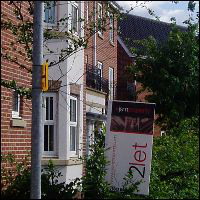 Is the coming decade going to be the one where Britain becomes more like countries in Europe where renting is the norm? Several interesting reports online today consider this.
Is the coming decade going to be the one where Britain becomes more like countries in Europe where renting is the norm? Several interesting reports online today consider this.
An article in the FT quotes the Department for Communities and Local Government’s Survey of English Housing, which shows that the proportion of owner-occupied homes in England has fallen from 71 per cent in 2003 to 68.3 per cent today.
Interestingly, they also say that, the figure for older householders paying off their mortgages has increased, with the number of people owning outright, without any mortgage, rising by 1m in the years to 2008, so that now nearly half of all owner-occupiers have no mortgage. The decrease is in new buyers with mortgages.
Does this perhaps mean the owner occupiership has peaked?
Meanwhile the Guardian considers a report from unbiased.co.uk which states:
- Over 1.75 million homeowners would now consider selling their home and renting compared to 12 months ago because of the housing market crash
- A third (31%) of renters state that renting gives them more freedom, without the hassle of owning their own home
- 12% of renters state they no longer aspire to the status symbol of owning their own home
Some people are therefore saying that we will become more like Germany where, say the Guardian, nearly two thirds of homes are rented. After all this used to be the case here – back in 1939, 55% of households in Britain were privately renting. In 1918 this figure was even higher at around 76%. But was this really because people preferred renting, or was it more because they could not afford to buy?
The FT article:
“average UK house prices are now nearly two and a quarter times the value they were 10 years ago, according to the Nationwide Building Society, leaving many people unable to afford to buy a property. The credit crunch – which saw house prices plummet across the UK and banks tighten their lending criteria – has exacerbated the situation, squeezing more first-time buyers out of the market”
But does this mean that home owning will decrease long term? James Hyman of property consultants Cluttons on this point:
“The lending criteria have changed so much that we’re probably going to see maybe as much as a five-year gap in the market where people will go back to saving again. It will probably be five years before people actually have saved enough to get back on the property ladder,” he says.
But Hyman suggests the home ownership dream is unlikely to fade away. “I just don’t see that happening. It’s in the British mindset – most people want to own their own home, it’s just likely to take them longer to make that purchase.”
The Guardian interviews several people in different situations. A renter who prefers the advantage of paying less for a better property, a financial advisor who sold at the peak of the market to rent, a long term renter, and a renter who has just bought.
The long term renter is Penny Anderson who has rented for over 20 years and writes a popular blog, Renter Girl. She says that she would love to buy, if only she could afford it, and sets out the disadvantages of renting, quoting
- the lack of security
- landlords failing to renew tenancies if you question anything
- tenants being charged spurious fees, such as for references
- tenants being thrown out if the ask for essential repairs to be done
“When you are a tenant” she says, “your house is never your home. Everything conspires to make you feel unsettled. You can’t decorate it the way you might want it to be, and woe betide you if you put a nail in the wall. I’d give anything to have the money to be able to buy my own place.”
She also points out that many rental properties, particularly those built in city centres during the property boom, are inadequate for modern living being far too small, with minimal or zero space for storage.
Anderson says that for renting to become more attractive there would need to be a change in culture.
“Tenants need to be allowed to stay for a good few years in the place they are renting, be allowed to decorate, and be treated like human beings.”
Many landlords, she suggests, consider tenants to be ‘losers’ simply because they are unable to own their own home.
My own feeling is that most people who are settled in an area (as opposed to people who are likely to move to another area within a year or so), will want to buy if possible. The main reasons why they will rent rather than buy will be financial.
What do you think? Do you think that the coming decade will bring an end to the home owning culture in Britain? Or do you think that we will become more like Germany and have a greater proportion of rented housing?
I would think the decade of pro renting legislation is coming to an end. There are already moves afoot to stamp out BTL.
Disappointing to see ‘RenterGirl’s’ views on her excperience as a tenant. Maybe she just hasn’t met the right landlord yet?
The coming decade will be interesting; on one hand, increased (forecasted) rental demand, on the other increasing regulation in the rental sector.
Thats interesting, Nick. What moves would you say are being taken?
Thanks for your comment Jim. I am sure that landlords will hope that there is less rather than more regulation, but it will probably be a vain hope. Unless they build a lot more houses though, there will certainly continue to be demand. What extra regulation do you see on its way?